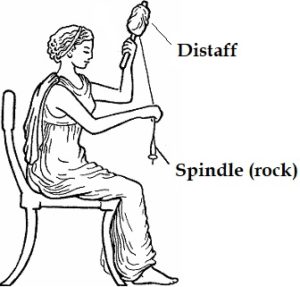GOD’S WISDOM FOR YOU
PROVERBS 31:19
19 She stretches out her hand to the distaff,
and grasps the spindle in her palm.
The tenth letter of the Hebrew alphabet is yod, the little letter that resembles an apostrophe ( ’ ). Here it begins the word yad, which means “hand.” A rare idiom here is “she stretches out her hand,” employing what a recent conference paper called an “idiomatic piel,” which is a use of the intensive Hebrew piel (two syllables, pee-ayl) stem to show something done in a manner peculiar to the way of Hebrew speaking or thinking, rather than merely using the hand in general (Job 28:9). Certain methods of spinning yarn or flax involve pulling the wool in a peculiar way which could well be described as “stretching the hand.” Martin Luther discerned that this spindle (pelech) must have been a slender rod or stick used to wind thread as it is spun from a mass of wool or flax. No earlier commentator had made that connection. It was spun with the motion of the wrist. In ancient times, the distaff was held with one hand or thrust into the cleft of a rock or tree, while the yarn was pulled out and wound by the spinning action of the spindle (the modern spinning wheel is a German invention from the sixteenth century).
The term pelech was later used as a name for a city’s districts (or half-districts), perhaps the way we use the word “circuit” in civil matters (Nehemiah 3:9,12,14-18).
Spinning with spindle and distaff.
The ideal wife takes it on herself to do what needs to be done. This verse along with others falls under the heading “she manages the estate” (verses 13-15, 19, 21-22). Why aren’t these clustered together in a more organized way? The easiest answer is that the true key to the composition is in the alphabetic acrostic structure, and so the various themes are interwoven according to the spelling of certain words. A good outline of the themes for “The Heroic Wife” comes from the Africa Bible Commentary, p. 1769:
The Blessings of a Good Wife (31:10-12)
She provides clothing and food for her family and servants (31:13-15, 19, 21-22)
She manages the estate (31:16-18, 27)
She cares for the poor (31:20)
She sells her own handwork (31:24)
She secures a future for her family (31:25)
She is engaged in teaching (31:26)
Her husband is well respected (31:23)
Her children respect and bless her (31:28)
She surpasses all other women (31:29)
All of these things that she does, as we are about to see, come from faith. A good work, even a Commandment kept, apart from faith, is no good work at all. The only good works acceptable to God are those done out of faith in Christ (Ps. 101:3; 2 Cor. 8:3-4,12). The ideal and heroic wife does not do what she does to earn a reputation for herself, but to praise and glorify God the Savior. Her calling to be a wife is a God-pleasing calling to an institution God himself created for the benefit of all mankind. Anyone who despises marriage and the roles of husbands and wives despises God who made them so. When we embrace our roles as husbands or wives and fulfill our vows out of love for God and each one’s spouse, then we will please God as well as our spouse. Luther said, “He who does that, even though he fall down the stairs and die, can nevertheless say: My father, my mother, my master, my mistress, told me to go down [those stairs]; therefore I die in a blessed calling, in the performance of a work that is pleasing to God” (St. L. XIII:2218).
When our sons were younger and learning their Catechism at home, we heard the words “We should fear and love God…” over and over again from frustrated young mouths and minds trying to remember the words of the Ten Commandments and their meanings. My wife would sometimes stop the boys and remind them: “We do these things as a thank-you to God, not because we have to.” And she would launch into an application of God’s word. Time after time, Kath would use whatever the previous sermon or Gospel lesson happened to be and go from there into the way we show our faith with what we do. “Like Daddy said in the sermon,” she would say, while I was still trying to come up with an example out of my head. Her role as the Christian listener was more valuable at those times than my own role as the preacher.
This is how the heroic wife makes sure that her children are wound firmly and soundly around the word of God and the promise of the Gospel. Like wool coming off the distaff and winding around the spindle as good, useful yarn, she can be confident that her children will never wonder whether they are part of God’s plan, useful to God, have a place in the universe, or have a place in God’s eternal heaven. All their lives she has been gently, lovingly, and endlessly weaving the words of the Holy Scriptures into their lives. They are confident in their Savior because their mother and I have shared with them the words of everlasting life. A worldly hero might save a life. A true, godly hero, works to save the lives of her family for all eternity.
In Christ,
Pastor Timothy Smith
Archives by Wisconsin Lutheran Chapel: www.wlchapel.org/connect-grow/ministries/adults/daily-devotions/gwfy-archive/2019
Listen to Bible classes online. Invisible Church is the twice-weekly podcast of the St. Paul’s Lutheran Church Bible class. Go to https://splnewulm.org/invisible-church-podcast/ and wait for the page to load. Classes on Genesis, 1 Corinthians, Galatians, Colossians and more are available now. Also available on iHeart Radio, Apple iTunes and Google Podcasts.
Pastor Smith serves St. Paul’s Lutheran Church, New Ulm, Minnesota
